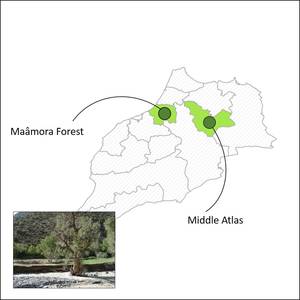Morocco
Over the last few decades, Morocco has experienced very significant economic and demographic development in a context of climate change that affects all sectors. In its national determined contribution (NDC), the Moroccan government clearly indicates the forest sector’s potential for adaptation and mitigation with a restoration target of 40 000 hectares (ha) per year by 2020 (200 000 ha between 2015 and 2020). It provides clear national options, including the restoration/rehabilitation of degraded ecosystems. In terms of mitigation, the forest sector represents 11.6 percent of the total effort over the period 2020–2030 to reduce greenhouse gas (GHG) emissions.
With regard to adaptation, the country's objectives: (i) follow a participatory approach that is gender-sensitive; (ii) are based on technical data, scientific data and traditional knowledge; (iii) integrate adaptation action into the regional cooperation framework, with the aim of making it more effective and sustainable; and (iv) include developing a national adaptation plan for forest ecosystems, with initiatives and actions to strengthen the resilience of forest ecosystems.
In order to tackle the issue of forest and landscape degradation and climate change in the Mediterranea region, the Forest and Landscape Restoration Mechanism developed “The Paris Agreement in Action” project supported by IKI/BMU with Morocco among the six focus countries – Morocco, Lebanon, Philippines, Fiji, Niger and Ethiopia.

IMPACTS
Within this framework, Morocco is very committed to promoting forest and landscape restoration (FLR). The project will support this effort and focus on three main components:
- Revision of the nationally determined contribution (NDC) of Morocco to clarify the forest/FLR contribution to the NDC and reinforcement of land degradation neutrality (LDN) activities: the project will support experts to refine the forest projects that are listed in the NDC of Morocco.
- Implementation of restoration activities in the Maâmora forest: innovative contracts with local users are established to compensate for the temporary loss of grazing land, maintenance of protected perimeters, including alternate activities like beekeeping or collection of medicinal plants.
- Improvement of the Moroccan national inventory system of greenhouse gases (SNI-GES): the project will support a pilot forest inventory of 1 000 plots in the cedar ecosystems of the Middle Atlas as the preliminary phase of a national forest inventory.

